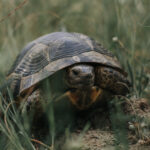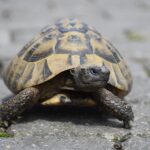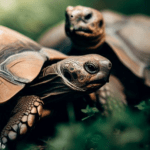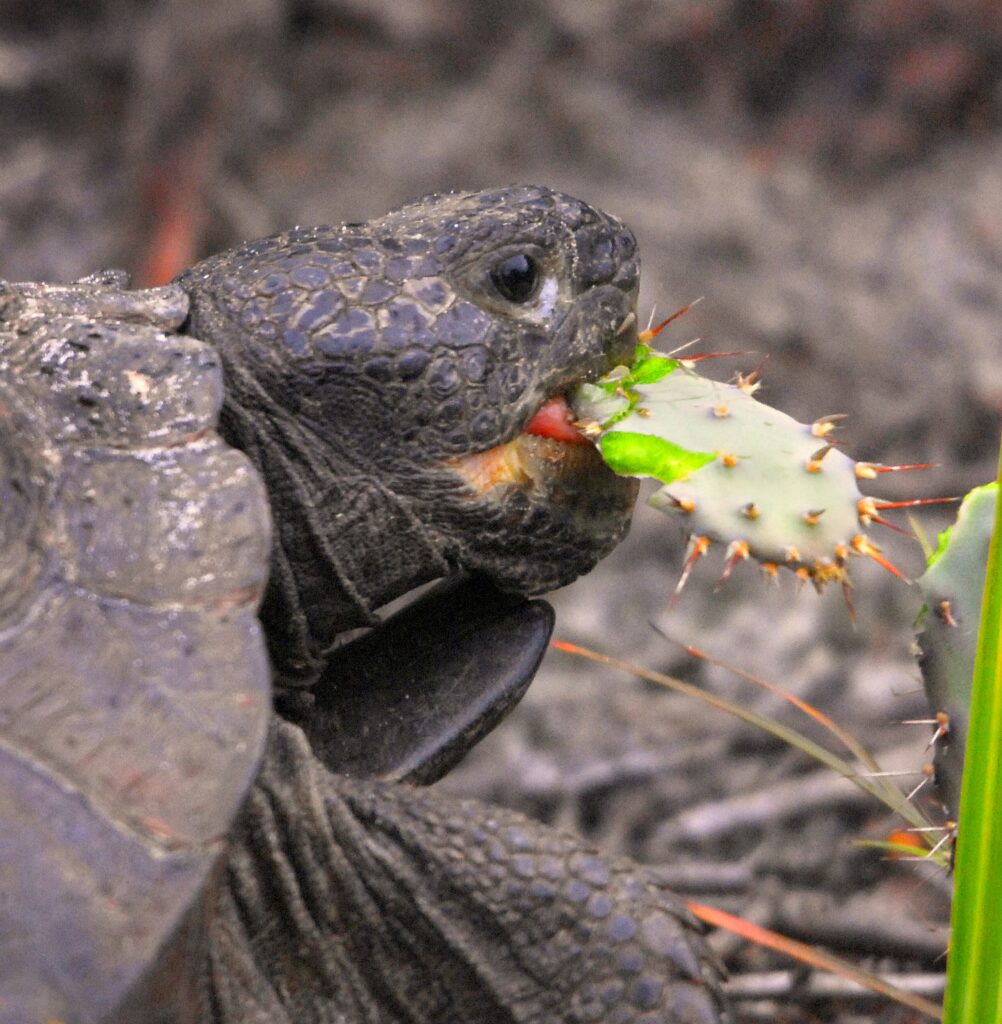
Image: Gopher Tortoise snacking on Opuntia Wikimedia Commons CC 2.0
Tortoises are fascinating, slow-moving creatures, and we often wonder what they eat. Do they feast on bugs and insects? Let’s explore this topic!
Herbivores by nature, tortoises mainly eat plants like grasses, leaves, fruits, and flowers. But they may also eat small bugs for extra protein or nutrients.
Some tortoises have been seen opportunistically eating snails, beetles, and other insects. Adding to their mystique, a wild giant tortoise was once spotted eating butterflies!
So, what can we conclude? Tortoises enjoy a buffet of plants, veggies – and sometimes bugs!
Key Takeaways
- Tortoises are primarily herbivores and their diet consists mainly of plants and vegetation.
- While tortoises may occasionally eat small insects or bugs, it is not a significant part of their diet.
- Insects may be consumed by tortoises accidentally while grazing on plants or if they are attracted to the smell or movement of the bugs.
- It is important to provide a balanced and appropriate diet for tortoises, focusing on leafy greens, vegetables, and fruits.
- Feeding tortoises a diet high in insects can lead to health issues and nutritional imbalances.
- If you notice your tortoise consuming a large number of bugs, it is recommended to consult a veterinarian to ensure their diet is appropriate and to address any potential health concerns.
What do tortoises eat?
Tortoises are mostly herbivorous, with a varied diet of plants, fruits, and vegetables. Leafy greens, grasses, cacti, and flowers are all on the menu. Plus, fruits like apples, bananas, and berries. And, they need fresh water to drink and soak in. Diet varies by species and natural habitat.
- They eat lettuce, kale, dandelion greens, spinach, and hibiscus flowers.
- Plus, some edible flowers like marigolds or pansies.
- And, succulent plants like prickly pear cactus pads.
Yet, certain species can be omnivorous, such as the red-footed tortoise. Eating small amounts of protein like insects or snails. Amazingly, an extinct species called Meiolania ate carrion! Showing that over time, tortoises can adapt. Why did the tortoise go to the buffet? Because bugs are the ultimate fast food!
Do tortoises eat bugs?
Tortoises, being herbivores, usually eat plants and vegetation. But, contrary to what many think, they do like the occasional bug-filled snack! They have been seen consuming small insects such as beetles, ants, caterpillars, and even snails. While bugs are not a main part of their diet, tortoises may turn to them for extra nutrients or hydration in dry surroundings.
This remarkable species has adapted to survive in various habitats around the world. Their ability to adapt and eat different food makes them intriguing creatures. Mostly they eat leaves, grasses, flowers, and fruits. Nonetheless, eating bugs is a unique behavior that adds diversity to their diets.
The Gopher Tortoise has an amazing relationship with bugs. It creates burrows that protect other animals from harm and bad weather conditions. In return, the Gopher Tortoise depends on these bugs for food! Beetles and other insects make up a large portion of its diet and keep the ecological balance in its habitat.
Tortoises’ capacity to include bugs in their diets shows how resourceful and adaptable they are. It is a symbol of their intelligence and survival skills. So, the next time you watch a tortoise having its leafy meal or eating a bug, remember that even these seemingly slow creatures love a protein-packed snack now and then!
Benefits of incorporating bugs into a tortoise’s diet
Adding bugs to a tortoise’s diet has many benefits. These include:
- Higher Nutritional Value: Bugs have proteins, calcium, and vitamins that are crucial for a tortoise’s health.
- Better Digestion: Bugs contain natural enzymes for better nutrient absorption.
- Oral Health: Chewing on insects wears down a tortoise’s beak and keeps it in the right place.
- Mental Stimulation: Hunting and catching bugs engages a tortoise’s natural instincts.
- Disease Prevention: Some bugs are natural remedies against parasites and other issues.
- Environment: Introducing bugs into a tortoise’s diet keeps them interested and happy.
Mealworms, crickets, and snails provide additional benefits for the tortoise.
African spurred tortoises are an example of species that rely on dung beetles for nutrition.
Sally’s Eastern box turtle Finnegan was lacking energy and had soft shell syndrome. After adding earthworms and beetles to his diet, he regained strength and his shell hardened.
It is clear that bugs are important for a tortoise’s health and happiness. Even the fussiest of tortoises seem to relish them!
Types of bugs that tortoises can eat
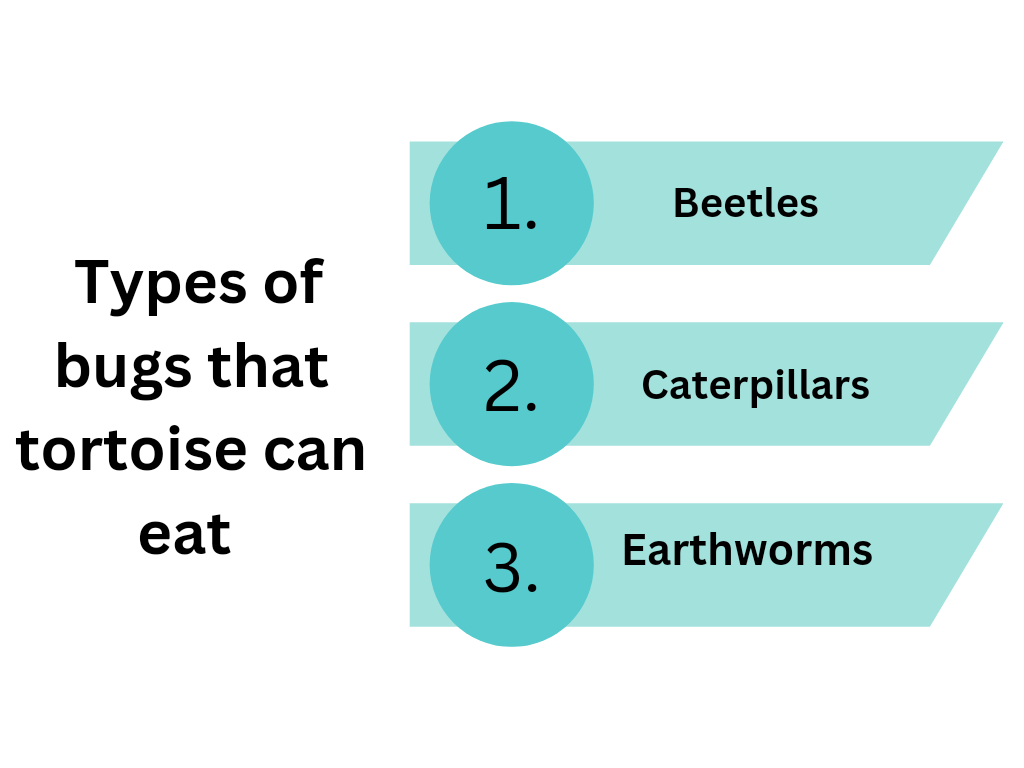
Tortoises are herbivores, usually feasting on plants. But they can also eat bugs! Beetles, caterpillars and earthworms are all on the menu.
Beetles provide crunchy textures, caterpillars give good protein, and earthworms are a delicacy.
But be careful! Not all bugs are safe for tortoises. Some may be toxic or have parasites. To avoid ninja assassin tortoises, make sure any bugs they eat are suitable for them.
Precautions when feeding bugs to tortoises
When feeding bugs to tortoises, take necessary measures to guarantee their well-being. Here’s a helpful table to get you started:
| Precautions | Description |
|---|---|
| Types of bugs | Offer tortoises safe bugs such as mealworms, crickets, or earthworms. Avoid toxic ones. |
| Size of bugs | The size of the bugs should be suitable for their age and size. Too big can be a choking hazard; too small may not provide enough nutrition. |
| Frequency | Feed bugs as a supplement, not as the main food source. Too many bugs can cause digestive issues and imbalances. |
| Gut-loading insects | Before giving them to your tortoise, make sure the bugs are gut-loaded with nutritious foods. |
| Pesticide-free | Don’t use insects exposed to pesticides as they can be fatal. Opt for organic sources when possible. |
It’s also vital to remember that some tortoises may have dietary needs or allergies. Always ask a reptile vet before introducing new foods.
Make sure your tortoise is in the best of health with these precautions. A balanced diet will give them the necessary boost to stay happy and healthy! So don’t miss out on the chance to give your tortoise the best care. Act now and create a more content and healthier reptilian companion!
Feeding strategies and tips
Provide a balanced diet with veggies and fruits for your tortoise! Leafy greens, such as kale, lettuce, and spinach, are rich in vitamins and minerals. Additionally, offer calcium-rich foods like cuttlefish bone or calcium blocks. As a treat, you can add berries and melons in moderation. Water should always be available. Adjust portion sizes depending on the size and activity level of your tortoise.
It is essential to research and consult a reptile veterinarian when it comes to the dietary needs of your tortoise. In Ancient Egypt, it was believed that certain plants consumed by tortoises produced medicinal urine. It reveals the importance of understanding their dietary habits throughout history.
By following these feeding strategies and tips, your tortoise will remain healthy and content at mealtime. So, there you have it – tortoises don’t need tiny snacks, just the right nutrition!
Frequently Asked Questions
Q: Do tortoises eat bugs?
A: Yes, tortoises do eat bugs. While their main diet consists of plants and vegetation, some species of tortoises also consume insects and other small bugs as part of their natural diet.
Q: What kind of bugs do tortoises eat?
A: Tortoises may eat various types of bugs including beetles, ants, grasshoppers, spiders, and worms. However, it is important to note that not all species of tortoises have the same dietary preferences, so it’s best to research the specific needs of your tortoise.
Q: Are bugs a necessary part of a tortoise’s diet?
A: Bugs are not a necessary part of a tortoise’s diet. Most tortoises receive the necessary nutrients from a balanced plant-based diet. However, offering bugs as an occasional treat can provide additional protein and enrichment for the tortoise.
Q: Can tortoises eat bugs found in the wild?
A: While tortoises may consume bugs found in the wild, it is important to ensure that these bugs are safe and free from pesticides or other harmful substances. It’s generally recommended to provide commercially bred insects or insects specifically sourced for feeding pet tortoises.
Q: How should bugs be prepared for a tortoise’s diet?
A: Bugs should be properly cleaned and gut-loaded before feeding them to a tortoise. Gut-loading involves feeding the bugs with nutrient-rich foods to enhance their nutritional value before being consumed by the tortoise. It’s also important to ensure that the bugs are an appropriate size for the tortoise to prevent choking hazards.
Q: Can feeding bugs to tortoises be harmful?
A: Feeding bugs to tortoises in moderation is generally safe. However, overfeeding bugs or relying solely on a bug-based diet can lead to imbalances in a tortoise’s nutritional intake. It’s always recommended to consult a reptile veterinarian or an expert in tortoise care for specific dietary advice.
Conclusion
Do tortoises eat bugs? Yes! They consume insects to get essential proteins and nutrients. But bugs should not make up the majority of their diet. A balanced and varied diet is best for their health. Include leafy greens, veggies, and fruits. Also, give them an occasional insect treat!
To make sure these two species live in harmony:
- Give tortoises a special space to forage for bugs. This supports their diet and environment.
- Create a barrier or fence around your garden to keep out unwanted bugs while still allowing beneficial insects to move freely.
By doing this, we can help tortoises feed on bugs and protect our gardens!
References

